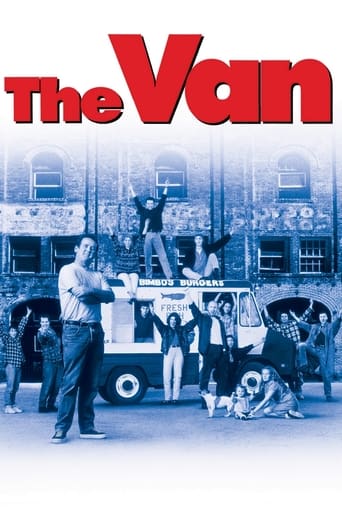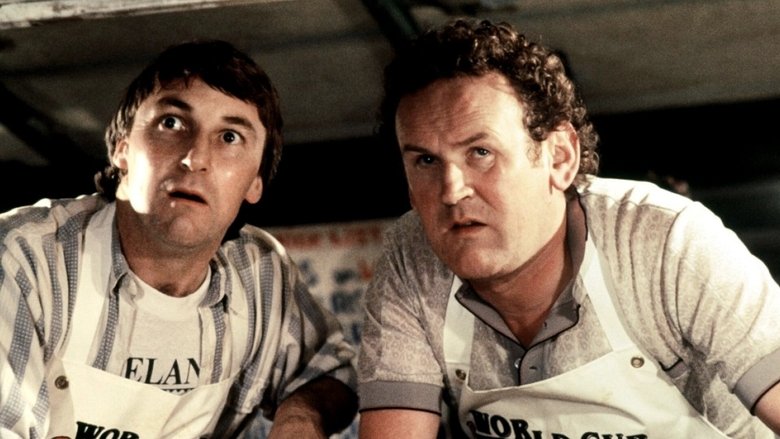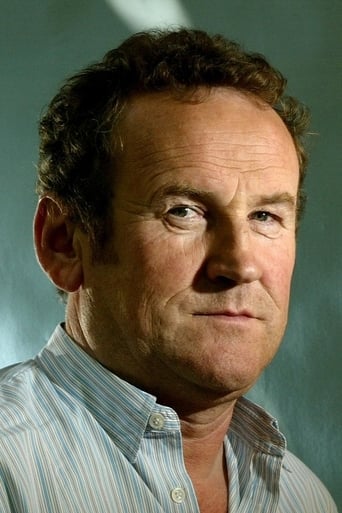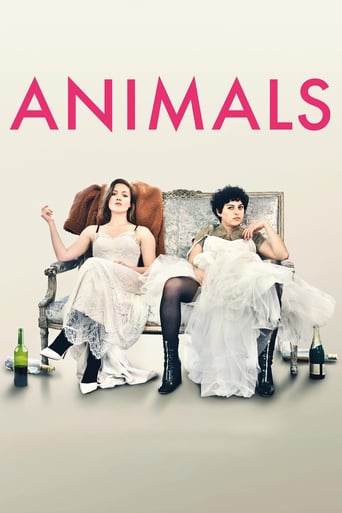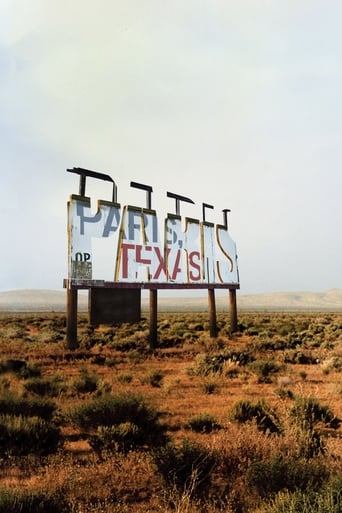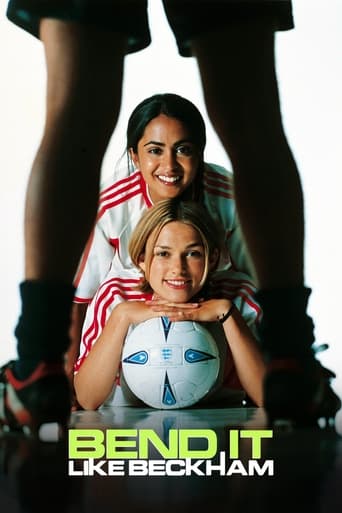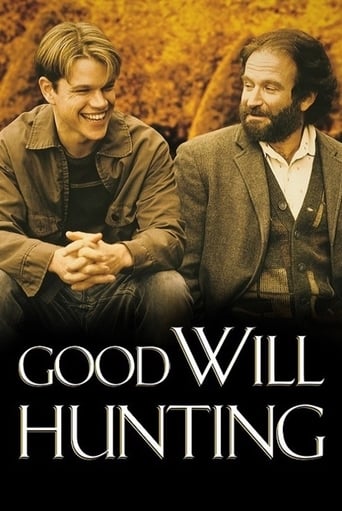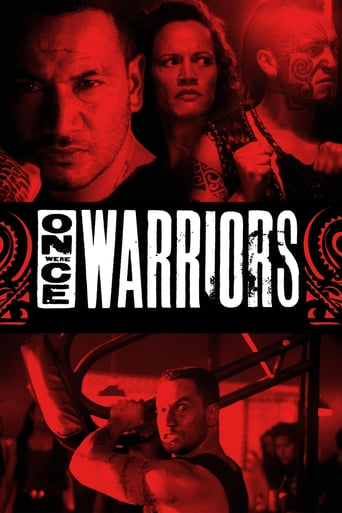The Van (1997)
In a working-class quarter of Dublin, 'Bimbo' Reeves gets laid off from his job and, with his redundancy payout, buys a van and sells fish and chips with his buddy, Larry. Due to Ireland's surprising success at the 1990 FIFA World Cup, their business starts off well, but the relationship between the two friends soon becomes strained as Bimbo behaves more like a typical boss.
Watch Trailer
Free Trial Channels
Cast


Similar titles
Reviews
Not even bad in a good way
While it doesn't offer any answers, it both thrills and makes you think.
Blistering performances.
It's easily one of the freshest, sharpest and most enjoyable films of this year.
It's November 1989. Bimbo (Donal O'Kelly) is fired from the bakery. His best mate Larry (Colm Meaney) is struggling with only welfare for the coming Christmas. Bimbo is about to consider a MacDonald McJob when the guys are shown a food van. It's a piece of junk that doesn't even have an engine. Bimbo's wife buys the van and he invites Larry to join him selling fish and chips. Their chips van does smashingly as Ireland advances in the World Cup.It's a steady decline from 'The Commitments' to 'The Snapper' and then to this. A more direct connection would have been better but I'm not an entertainment lawyer. It's still a fun watch. Donal O'Kelly doesn't have the screen presence. Colm Meaney is back and he overshadows everybody else. The trick is to make these poor losers lovable. Colm Meaney has that in spades. It would be better for them to get a steady young kid as their third. The relationship in the van is where this movie could have excel more. The guys' friendship could be more likable. I especially didn't like them picking up the ladies at the bar. Even their bickering could have been done with a lighter touch. Nevertheless it's still a fun ride.
As an Irish person I couldn't help but cringe a little whilst watching this film, much as I enjoyed it. Its seems to be the same ''poor us,we've nothing, down on our luck'' story that seems to be the running theme through a zillion other Irish films & in particular, Roddy Doyle stories. We've seen it all before.The film has some quite funny moments, and the stereotypical Irishman, Colm Meaney does his usual business but the storyline is quite weak and simplistic really. I don't think I came away from the film any wiser than before.I think its time Irish film making upgraded with other countries and maybe feature something like casino's, beaches, hot girls, edge of the seat mob thriller instead of war, famine,unemployment, tradgedies, gypseys, priests, and in this case two idiots opening a chip van.
The Van, a 1996 Stephen Frears film who would go on to much better things, takes on the ideas of desperate, inglorious situations and scenarios, such as unemployment, and wraps them up into packages ready to be delivered as comedy. There is nothing at all funny about the situation the two leads in the film find themselves in, but there is something distinctly charming about the way in which they deal with it.While not essentially British, a given thanks to the over emphasis on how wonderful it was for the characters to witness the Irish football team pull back a goal and hold on for a draw against the English, while most of the other matches go unnoticed. However, it is directed by an Englishman and the film does posses rather a few items that were written about in regards to some growing fears and concerns simmering at the time within the British film industry, with particular attention to the comedy genre. If we recall Claire Monk's writings in the late 1990s, we might think of films such as Brassed Off and The Full Monty as being films depicting jobless British males turning to alternate methods of money making to get by; effectively rendering the crisis of post-industrialism (closure of mines and steel mills) as a crisis of masculinity. She also writes about these films transitioning problematic situations into comic solutions. These ideas and scenarios might be applicable to The Van, a film that spins job-loss and perceived men in crisis into a series of jokes and gags; a film that, like said examples, see the leads turn to either an entertainment or cultural supply and demand industry, in which they eventually come to relish.One of the two leads in The Van is Bimbo (O'Kelly), a man who has lost his job and gets by off of his redundancy money. The other is Larry (Meaney), and between them, they aim to get a portable fast food outlet up and running. Whilst it's not about becoming strippers or brass-band musicians, it is essentially about two men turning to cooking and meal preparation by way of getting by. Its set up; a male panic, followed by a lot of sitting around complete with head scratching before hitting upon an idea to move into what is a form of the cooking industry, sees the two leads adopt a culinary position; something that Monk may have been alluding two when she describes early 1990s 'new men' as having to now share the once sole motherly burdens; this of course includes cooking and meal preparation. Yes, it's a fast-food van but the progressive realisation that the only way to deal with the 'panic' is to do something thought of initially as somewhat unthinkable and hapless, is certainly explored; the last resort, 'you'll never see me doing that/in one of those things' notion is tested before becoming the source of humour. One character refers to burger vans as portable 'food poisoning', before succumbing to working within one later on.The van of the title acts as both a physical representation for the nucleus of the two leads' study, but also as a cinematic space in which it is able to play out. When we first encounter the van, it is located in a desolate and sorry place; a place that sees its characters struggle to push their way through all the other hazards around it just to catch a glimpse. The van is broken, worn-out and decrepit – it's seen better days. But the van is transformed; it is updated and goes through a process of modernity before, in time, is back up and running and solving the characters' problems. The process the van goes through is similar to that of the main characters, as these beaten and well-worn individuals whom have seen better days suddenly becoming success stories again; garnering a final day in the sun.But if The Van is supposed to be a comedy, blending in the harsh and realistic working class life of terrace house living; cramped conditions; redundancy and frustrations with one's overall life with what is, I think, supposed to be a 'feel-good' approach; then it's not a terribly funny one. One of the film's stranger scenes applies a very visceral sense of humour whilst exploiting what little knowledge these perceived men in crisis actually know about the kitchen 'space'; that being when Larry scolds himself whilst trying to deep fry fish and fry eggs, with the fat popping and jumping up onto his forehead and hands thus scolding him. It's an odd scene; a scene in which the male is ill-suited to his culinary surroundings, we are invited to laugh before realising that if he doesn't get back in there, give it another crack and get it right then his life will get doubly worse in an instant.But The Van has charm, although its charm isn't really enough. It doesn't invite us to laugh at two people on the skids as much as it does invite us to marvel and be entertained at the manner in which they refuse to buckle and hit rock-bottom. The film's humour is too wavy, either settling for scenes in which its characters are under the influence of alcohol or instances in which the burger van is mobbed by a sea of customers all shouting and ordering at once which, and granted, I haven't ordered many meals from many burger vans, but I'm smart enough to know, just doesn't happen. However, you might say its inconsistencies and its broad, uneven feel help in adding to its overall charm of two people just trying to get by; and I wouldn't really begrudge anyone for being fond of it for that.
This is the story of two men belonging to the the Irish working class who after being sacked decide to start a business with a van for making and selling hamburgers and the like stuff. After a while their mutual relationship turns into a boss-employee one and things began to become worse until because friendship is thicker than money they began again to get well along with each other. The story is told in a half serious half funny way. It's very simple but not the less deep because of that. It's full of amusing episodes and details of everyday life but its very true, authentic and realistic.

